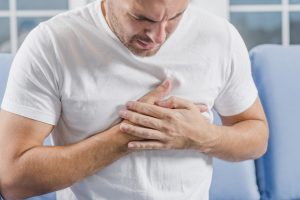
freepik.com
Heart failure, such as heart attack and cardiac arrest, is the leading cause of death in most countries. One of the factors is because during these emergency situations, it only takes a few minutes for the patient to die and three-quarters of them happen at home where emergency responders are not present. Therefore, when this occurs, it is best to do an immediate response while waiting for help so not a minute is wasted which is very critical when it comes to a patient’s survival.
What should I do?
First, you need to know the difference between heart attack and cardiac arrest in order to perform the proper first aid treatment.
Cardiac Arrest
Cardiac arrest is where the heart malfunctions and stops beating unexpectedly due to an “electrical problem”. With the heart unable to beat, the blood and therefore the oxygen carried by the blood cannot be pumped to the brain and the internal organs. Thus, causing the person to:
- Lose consciousness
- Not breathing / only gasping
- Heart stops beating / absent pulse
- Die if immediate treatment is not provided
What to do when a person is experiencing a cardiac arrest?
Basically, you need to help the heart of the patient to function and pump blood.
- First, call an ambulance (dial 998 for UAE). Tell them the situation and ask if there is an Automated External Defibrillator (AED) available around the area (if there is none on your premises).
- Second, start CPR (Cardiopulmonary Resuscitation) right away. It is better if one person will do the CPR and the other finds an AED.
- Then, once AED is available, immediately use it. If not, continue CPR until the emergency response team arrives.
Heart Attack
Heart attack is a blood circulation problem wherein the flow of blood to a certain artery of the heart is blocked causing that part of the heart to lack supply of oxygen. This will cause severe damage to the heart if not treated early.
Unlike cardiac arrest, heart attack has a different range of symptoms, going from no symptoms (a.k.a silent heart attack), mild, up to severe. These symptoms most likely to occur slowly and will continue for hours and even weeks before the actual heart attack.
What to do when a person is experiencing a heart attack?
A heart attack may be confusing for it has a lot of symptoms causing other people not to realize that they are experiencing a heart attack. So whenever one of these symptoms occur, either you see someone experiencing it or you are the one suffering from it, it is best to:
- Call the ambulance right away – the ambulance can take immediate action once they arrive at your place which will give the patient faster treatment rather than driving yourself to the hospital.
- Rest your body either by sitting or lying down.
- If you were instructed by your doctor to take any medicine during this situation, do accordingly.
- If you feel tightness on the chest or cannot breathe, sit up.
- If you feel like you are losing balance/about to faint, lie flat.
Do these while waiting for the emergency responders.
Are cardiac arrest and heart attack connected?
Cardiac arrest is caused by different conditions that interrupt the beating of the heart, but the common cause is heart attack. On the other hand, a heart attack doesn’t always lead to cardiac arrest.
These two conditions may be different from many angles, but they both cause someone’s death. Always be prepared to save lives.
How to prevent cardiovascular disease that causes heart attack and cardiac arrest?
There are lots of risk factors associated with cardiac arrest – heart rhythm disorders that are inherited, other health conditions, and heart attack – however, if a person who has no known risk factors of sca does these five lifestyle changes while keeping a non-sedentary lifestyle, it would dramatically improve health and decrease the risk for heart disease, sca, and other heart problems.
If you have experienced a heart attack and sca, it is best to have an automated external defibrillator (AED) at home or encourage your human resource manager to install an AED in your workplace so if anything bad happens, you feel secure.
References:
https://cpr.heart.org/en/resources/cardiac-arrest-vs-heart-attack
https://www.mydr.com.au/heart-stroke/heart-attack-and-cardiac-arrest-emergency-treatment
https://gulfnews.com/uae/health/heart-disease-top-killer-in-uae-study-1.2186653
